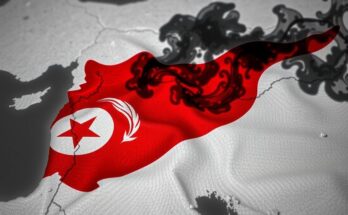On October 1, Israel initiated a ground invasion of southern Lebanon, escalating tensions amid the ongoing Gaza conflict. Experts analyzed Israel’s shifting objectives from merely weakening Hezbollah to neutralization, while cautioning that this approach may fail to eradicate the group. The balance of power in the region is shifting, particularly affecting Iran’s influence and its nuclear ambitions, amid skepticism about achieving peace due to the growing backlash against Israel’s actions. The upcoming US elections will factor into how much influence the next administration can exert over Israel’s continued military operations. Overall, the prospects for de-escalation remain dim without significant diplomatic efforts.
The ongoing conflict in the Middle East has escalated significantly, particularly following Israel’s ground invasion of southern Lebanon, which commenced on October 1. This invasion was closely followed by an extensive missile attack launched by Iran against Israel, with more than 180 missiles being fired. Amid the concurrent war in Gaza, analysts are increasingly concerned about the potential for a larger regional conflict. To gain insights into the reasons behind the escalation and the future of this situation, ten experts were consulted. One central question is Israel’s long-term objective in Lebanon. Experts suggest that Israel’s goals have shifted from merely weakening Hezbollah to a more ambitious aim of neutralizing the group permanently. However, despite the substantial losses Israel has inflicted, it remains challenging to eradicate Hezbollah completely. Observers note that while Israel claims to be enhancing its northern security by addressing Hezbollah’s threats, there is also a prevailing expansionist mindset within Israeli leadership that complicates this situation. The impact of this conflict may be reconfiguring the balance of power in the Middle East, albeit gradually. Analysts believe that Iran’s influence is diminishing, and Israel has potentially secured some tactical advantages. However, this tactical success remains to be translated into long-term strategic outcomes. The conventional assessment is that the long-standing deterrent balance between Iran, its proxies (Hamas and Hezbollah), and Israel has been disrupted, yet it is premature to conclude that a significant geopolitical shift is occurring. A crucial concern remains Iran’s nuclear intentions. The experts indicated that with Hamas and Hezbollah losing their deterrent capacity following recent events, there is a growing sentiment within the Iranian leadership advocating for the development of nuclear weapons. While Israel maintains superior conventional military capabilities, experts warned that any movement towards Iran’s nuclear ambition would be a direct threat to Israel and could escalate tensions further. The widening conflict appears to further complicate Israel’s objectives in Gaza. As Israeli military operations expand, they are likely to elicit a stronger backlash from populations sympathetic to Palestinians, making long-term peace efforts increasingly difficult. Observers assert that Israel lacks a political strategy beyond military action, which heightens the risk of perpetuating instability. The influence of the forthcoming US elections on the Israeli military operations is also a pivotal topic. While any president could theoretically exert influence over Prime Minister Netanyahu, there has been notable reluctance to leverage this influence. Both major American political parties exhibit internal divisions regarding support for Israel, complicating the administration’s ability to dictate terms to the Israeli government. To prevent a broader conflict, experts suggest that diplomatic efforts, rather than military victories, will be paramount. They outlined possible off-ramps, such as accepting ceasefires in Gaza and Lebanon, which would require difficult concessions from both Israel and Hezbollah. However, the prevailing sentiment is one of pessimism regarding the likelihood of such diplomatic breakthroughs in the near future. In summary, the situation in the Middle East remains precarious, with escalating violence risking the stability of the region. The failure to establish a coherent political framework for Israel’s actions in Gaza, coupled with the potential repercussions of Iranian nuclear ambitions, points to a complex, uncertain path ahead. Diplomacy, although challenging, appears to be the essential avenue for achieving long-term stability in the region.
The article addresses the escalating tensions and ongoing conflicts in the Middle East, particularly focusing on the recent military actions by Israel in southern Lebanon and the context of its broader conflict in Gaza. The piece encompasses analyses from various experts, examining Israel’s objectives, Iran’s nuclear ambitions, the impact of regional dynamics on power balances, and the future implications for peace and stability in the area. The ongoing situation presents an urgent need for understanding the complex interplay of military actions and diplomatic negotiations in achieving long-term resolutions to the conflict.
The Middle East conflict is at a critical juncture, characterized by heightened military actions, particularly from Israel, and significant regional implications stemming from Iran’s response and ongoing support for groups like Hamas and Hezbollah. The lack of a defined political strategy from Israel jeopardizes its military objectives, while the international political landscape—shaped by upcoming US elections—complicates external influences on these dynamics. As the situation unfolds, the necessity for diplomatic avenues and the establishment of ceasefires become ever more pressing to mitigate further violence.
Original Source: www.bbc.com




